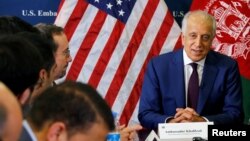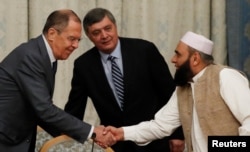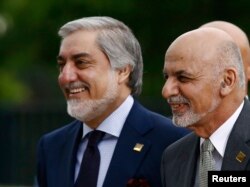President Donald Trump's envoy on Afghanistan is seeking Pakistan's help in persuading the Taliban to negotiate directly with Afghan President Ashraf Ghani's administration, according to a highly placed source with knowledge of the interactions.
Zalmay Khalilzad, the special representative for Afghanistan reconciliation, arrived in Islamabad Tuesday morning with an interagency delegation as part of his 18-day trip of the region to try to jump-start peace talks with the Taliban. This is his third visit to the region since he was tasked in September with delivering a negotiated settlement to the Afghan war.
A day before Khalilzad’s arrival, Pakistan Prime Minster Imran Khan received a letter from Trump.
Longtime advocate
"He [Trump] wants Pakistan to play its part and use its influence to bring the Taliban to talks. We have a very prime position in it [Afghan peace], and we will certainly make an effort. I have long advocated for it [peace talks]," Khan said in remarks aired on state-run television.
Khalilzad has tried previously to persuade the Taliban in his meetings with them, but they have strongly rejected the idea of talking to Kabul as a "waste of time," said Faiz Mohammad Zaland, a Kabul University professor who met with the Taliban in Moscow last month.
The Taliban call the Afghan Unity Government a puppet of the American "invaders" and want to negotiate directly with the Americans.
"When they [Americans] give an international guarantee for the withdrawal of their forces, then it's possible to talk to the Afghan side also — but in Afghanistan with those political parties who have influences with the people of Afghanistan, not this present government, because this government doesn't have support of the people," said Sher Mohammad Abbas Stanekzai, head of the Taliban's political office in Doha.
He made the comments while talking to a group of Russian journalists in Moscow in November, after a multinational conference on Afghanistan. The conference, called the Moscow Format, was the first time the Taliban had officially appeared in a public forum.
A timeline for withdrawal of foreign forces has long been the Taliban's prime demand as a precondition for negotiations on the future of Afghanistan.
Doha contingent's trip
A story published in the British Telegraph newspaper claimed that seven members of the Taliban's Doha office also arrived in Pakistan a few days ago at the order of the group's leader, Haibatullah Akhundzada.
"We will go word by word through the progress of peace talks with the top leaders. We will get their consultation on many issues to be in a better position in next week talks with Khalilzad," a member of the Doha office told The Telegraph.
Several analysts say the Taliban would also want a postponement of the Afghan presidential elections scheduled for April 20, 2019, and an interim government to facilitate the peace negotiations.
The idea has received a mixed reaction from Afghan officials.
Ghani's office has announced its commitment to the April election date, while Mohammad Mohaqiq, a deputy of Chief Executive Abdullah Abdullah, told VOA's Dari service that an interim government might be acceptable for "limited acts, such as holding presidential elections, national grand assembly, and providing a setting for constitutional reform," as long as it preserved the gains in human rights that Afghanistan has made in the past 18 years.
U.S. envoy Khalilzad has said that it will be up to Afghans to decide whether to postpone a vote, saying the outcome would be more acceptable to all parties if there was a road map to peace in place.
"I hope the Taliban and other Afghans would use the election date as a deadline to achieve a peace agreement before then. ... The sooner we get peace, the better it will be," he told a group of Afghan journalists in Kabul last month.
Terror list, prisoner exchange
Other Taliban conditions include official recognition of their political office in Doha, taking some of their members off the list of terrorists to enable them to travel freely, and an exchange of prisoners.
While the insurgents have made steady territorial gains in Afghanistan and have enjoyed newfound legitimacy on the international stage, they've indicated that they may be willing to negotiate if their conditions are met.
"Everywhere in the world, when there is war, the final decision is taken on the table. ... I think now it's a suitable time for the Afghan issue also that this should be solved on the table," Taliban envoy Stanekzai said in Moscow last month.
At the same time, the group has shown little flexibility when it comes to its core demands.
"We will not tolerate a single American soldier in Afghanistan," Stanekzai said.
Other than Pakistan and Afghanistan, Khalilzad is also scheduled to visit Russia, the Central Asian states of Uzbekistan and Turkmenistan, and Qatar and the United Arab Emirates on this trip.






